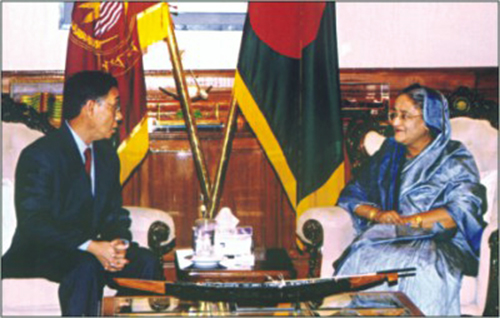Arakan State: Hardships endured by people throughout Burma’s Arakan State, notwithstanding, Rohingyas celebrated the second-largest festival ...
Maungdaw, Arakan State: Hardships endured by people throughout Burma’s Arakan State, notwithstanding, Rohingyas celebrated the second-largest festival of the year, Eid-u-Azah, said a religious leader in Maungdaw.
 Rohingyas in northern Arakan State reported being harassed by officers of Burma’s border security force (Nasaka) while trying to celebrate the festival.
Rohingyas in northern Arakan State reported being harassed by officers of Burma’s border security force (Nasaka) while trying to celebrate the festival.
Nasaka officials reportedly arrested several Rohingyas and extorted money from others, according to a local leader, who suggested that it was in retaliation for not supporting the junta-backed candidates during the November 7 election.
On November 16, before the beginning of the festival, a group of Nasaka officers from Taung Bazaar went to Donpiye village in Buthidaung Township and arrested villagers, saying they would be released only if they paid money, said a local elder from the village.
Other reports have surfaced of harassment in Nan Chaung, Kratro and Mangala Gyi villages in Maungdaw Township, according to a school teacher in Maungdaw.
Nasaka authorities have imposed myriad taxes on the purchase and slaughter of cattle timed to coincide with the festival and they made it mandatory for Rohingyas to give a portion of the meat to Nasaka personnel.
A violent incident occurred yesterday in Maung Nama Nge village in Maungdaw Township when a Nasaka officer tried to grab a portion of meat from a local resident identified only as Ahmed.
When Ahmed refused, the Nasaka officer kicked a woman identified as Somoda Khatun, who was standing nearby.
The attack prompted villagers to detain the officer and inform village chairman Deen Mohamed to intervene.
Four officers from Nasaka later arrived and took the woman and the officer, who attacked her back to their headquarters at Aung Min Gala for questioning. The woman was detained, while the attacker was released, a local resident said, adding that the woman remains in detention.
“Why do the Nasaka come to collect meat, since villagers have already given them supplies of meat?” asked a local village elder.
“It is clear that they just came here to cause trouble for us.”
A local businessman said fears of retaliation after the election seem to have been justified.
"People believed that after the election, the political situation might change for the better, but it has become worse. The men in charge have not changed, only the names have changed."


